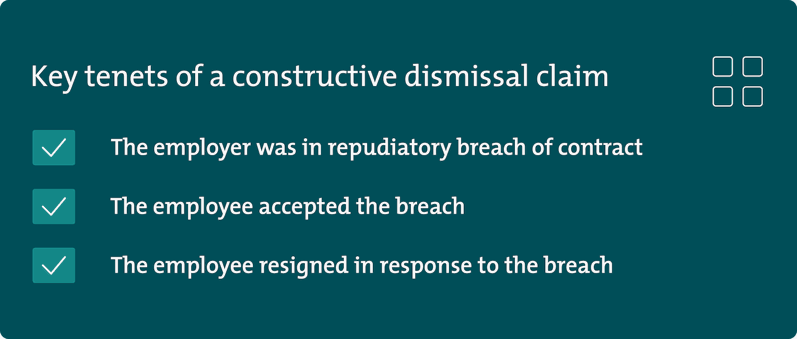Our employment law experts explain what constructive dismissal is, how it occurs and the typical remedies in successful claims.
The UK employment laws aim to protect employees by ensuring they are treated fairly and respectfully. This includes protection for employees who have had to resign due to the conduct of their employer. An employee who is being mistreated by their employer may wish to leave and make a constructive dismissal claim. This article sheds light on what constitutes constructive dismissal, eligibility for making such claims and what an employee has to demonstrate to prove constructive dismissal.
What is constructive dismissal?
Constructive dismissal occurs where an employer acts in such a way that the employee is entitled to resign. This could be because the employer has committed a serious breach of the employment contract or has committed a series of breaches that, taken together, amount to a breach of the implied term of trust and confidence.
Employees should, however, consider resolving the issue with their employer via the employer’s grievance procedure before resigning. Failure to do so could result in a 25% reduction of compensation to the employee if they are successful in a constructive dismissal claim but have failed to follow the ACAS Code of Practice on Disciplinary and Grievance procedures.
What is the difference between constructive and unfair dismissal?
Unfair dismissal claims are made by employees where their employment has been terminated by the employer and they consider that the employer does not have a fair reason and/or has not followed a fair process.
With a constructive dismissal claim, the employee resigns, but in order for the resignation to amount to a dismissal, they would have to demonstrate that they did so in circumstances that they were entitled to because of the employer’s conduct.
Eligibility
There are strict deadlines for making employment tribunal claims. For constructive dismissal claims, the employee has three months minus one day from either:
- The last day of their notice period
- The day of resignation, if notice was not served
To have the right to make a constructive dismissal claim, the employee would have to have:
- ‘employee’ employment status
- continuous service of two years
There are circumstances where an employee can claim constructive dismissal with less than two years’ service. These are where it is alleged that the reason for the dismissal is for:
- an ‘automatically unfair’ reason that does not require two years continuous service (e.g. whistleblowing) or
- discrimination
The constructive dismissal test
Constructive dismissal is governed by the Employment Rights Act 1996. To make a successful claim, the employee needs to show the following:
- That the employer was in repudiatory breach of contract;
- That the employee accepted the breach;
- That the employee resigned in response to the breach
Examples of what may amount to a repudiatory breach include:
- not paying the employee the agreed salary
- demoting the employee for no reason
- imposing changes without the contractual right to do so
- allowing people to harass or bully the employee at work

Proving constructive dismissal
The onus is on the employee to demonstrate that they have been constructively dismissed.
Employers are likely to seek to defend themselves by arguing that:
- there was no breach of contract e.g. the employee agreed to the change, there was a contractual right to make the change etc.
- the employee affirmed the contract
- the resignation was not due to the alleged breach but for some other reason e.g. to take up other employment
Should the tribunal find that an employee has been constructively dismissed, the employer still has the opportunity to argue that the dismissal was fair i.e. there was a fair reason for the dismissal, and they acted reasonably in dismissing for that reason.
Remedies
If the employee is successful in their claim for constructive dismissal, they would be entitled to unfair dismissal compensation. This is made up of a basic award calculated the same way as statutory redundancy pay and a compensatory award.
The compensatory award is compensation for financial losses e.g. loss of wages and benefits but, unless the constructive dismissal is for an automatically unfair reason or discrimination, this would be capped. In certain cases, e.g. discrimination, employees might be able to get damages for emotional distress. This is known as an injury to feelings award.
Summary
We regularly advise employers on managing grievances and dealing with tribunal claims, whether constructive dismissal or otherwise. If you face a potential claim of constructive dismissal, we may be able to assist.
If you need guidance on avoiding constructive dismissal or responding to constructive dismissal claims, contact our employment law solicitors.






